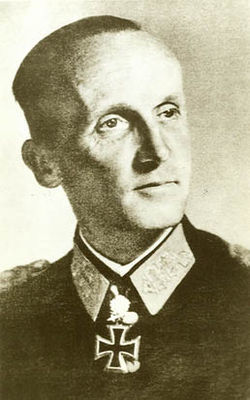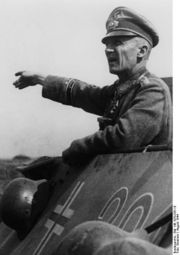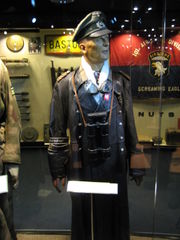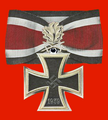Hasso von Manteuffel
| Hasso-Eccard Freiherr von Manteuffel | |
|---|---|
| 14 January 1897 – 24 September 1978 (aged 81) | |
 Hasso-Eccard Freiherr von Manteuffel |
|
| Place of birth | Potsdam, German Empire |
| Place of death | Reith im Alpbachtal, Austria |
| Allegiance | |
| Years of service | 1908 - 1945 |
| Rank | General der Panzertruppe |
| Battles/wars | World War I World War II |
| Awards | Ritterkreuz des Eisernen Kreuzes mit Eichenlaub, Schwertern und Brillanten |
| Other work | Politician |
Hasso-Eccard Freiherr von Manteuffel (14 January 1897 – 24 September 1978) was a German soldier and liberal politician of the 20th century.
He served in both world wars, and during World War II was a distinguished general. He was a tank commander noted for his tactical skill and was one of only 27 holders of the Knight's Cross with Oak Leaves, Swords, and Diamonds.
After the war, he was elected to Parliament and was the spokesman for defense of the Liberal Party. A prominent proponent of rearmament, he was responsible for coining the new name for the post-World War II German Army, the Bundeswehr.
Contents |
Military career
Von Manteuffel was born in Potsdam to a respected Prussian aristocratic family. In 1908, he became a cadet in a military school.
World War I
He joined the Imperial German Army on 22 February 1916 as an officer in a Hussar regiment. His World War I service began in April 1916 with the 5th Squadron of 3rd Hussar Regiment, attached to the 6th Prussian Infantry Division on the Western Front. He was wounded on 12 October fighting in France. After recuperating, he returned to active service in February 1917 and was posted to the Divisional General Staff.
Inter-war years
With the outbreak of the German Revolution in November 1918, he was assigned to guard the bridge over the Rhine at Köln against the revolutionaries and thus enable a safe withdrawal of the army from France and Belgium to Germany. Following the dissolution of Imperial Army, he entered the Freikorps in January 1919. After the establishment of the Weimar Republic, he joined the newly created Reichswehr and was assigned to the 25th Cavalry Regiment at Rathenow in May 1919. During the early 1920s, he was a squad leader with the 3rd Prussian Mounted Regiment, later becoming the Regimental Adjutant. On 1 February 1930, he became the commander of the Technical Squad.
On 1 October, 1932, von Manteuffel was transferred to the 17th Bavarian Mounted Regiment at Bamberg, serving as a squadron commander. Two years later, on 1 October 1934 he was transferred again, this time to the Mounted Regiment "Erfurt". On 15 October 1935 he was appointed commander of the 2nd Motorcycle Rifle Battalion of Heinz Guderian’s 2nd Panzer Division. From 1936 to 1937 he served as a major on the staff of the 2nd Panzer Division and as a training officer of cadets and cadet officers. On 25 February 1937 he became a consultant in the Panzer Troop Command of the OKH, and on February 1, 1939 a senior professor at Panzer Troop School II in Berlin-Krampnitz. He remained there until 1941, thus missing out on the campaigns in Poland and France.
World War II
On May 1, 1941, von Manteuffel was appointed commander of the 1st Battalion, 7th Rifle Regiment of the 7th Panzer Division. With this unit, he served under Hermann Hoth’s Panzer Group 3 of the Army Group Centre in Operation Barbarossa, the invasion of the Soviet Union. On 25 August 1941, he took over the 6th Rifle Regiment of the 7th Panzer Division after its commander was killed in action. In May 1942, after having engaged in heavy fighting around Moscow in the winter of 1941–1942, the 7th Panzer Division was transferred to France for refitting. On 15 July 1942, while the division was still in France, von Manteuffel was made the commander of the 7th Panzer Grenadier Brigade of the 7th Panzer Division.

In early 1943, von Manteuffel was sent to Africa, where on 5 February he became the commander of the Division von Broich/von Manteuffel, serving in Hans-Jürgen von Arnim's 5th Panzer Army of Erwin Rommel's Army Group Afrika. Here von Manteuffel took part in defensive operations during the Battle of Tunisia, conducting a series of successful counteroffensives that tied down Allied forces. In the midst of heavy fighting, he collapsed from exhaustion on March 31, and was evacuated back to Germany. On 1 May 1943, von Manteuffel was promoted to the rank of Major General for his exploits in Africa.
After recuperating, von Manteuffel was made the commander of the 7th Panzer Division on 22 August 1943 and was once again on the Eastern Front, which had by then collapsed following the Battle of Kursk and the resulting Soviet counteroffensive. Despite being wounded in the back in a Soviet air attack on 26 August 1943 he stayed on, battling in Ukraine. After ferocious fighting at Kharkov, Belgorod, and along the Dnieper River, he succeeded in bringing the Red Army offensive to a halt. In late November, he managed to recapture Zhitomir, thus saving the almost encircled 8th Panzer Division north of the city.
As a result, von Manteuffel was made the commander of the élite Grenadier Division Großdeutschland on 1 February 1944. His command engaged in a series of intense defensive battles west of Kirovograd, then withdrew across Ukraine, and reorganized in Romania in late March 1944. It engaged in a series of successful defenses in northern Romania through June, when the exhausted Großdeutschland was moved into reserve for a refit. In late July Großdeutschland was ordered to East Prussia, which was being threatened after the Red Army crushed Army Group Centre in Operation Bagration. Here he launched a successful but costly counterattack into Lithuania, managing to stabilize the front, but failing to break through to the Courland Pocket, where Army Group North was trapped after the decimation of Army Group Centre.

On 1 September 1944, von Manteuffel was promoted to General of Panzer Troops (General der Panzertruppen - US equivalent Lieutenant General) and given command of the Fifth Panzer Army, fighting on the Western Front. After engaging in heavy combat in Lorraine against George S. Patton’s Third Army, the unit was withdrawn to reserve and began refitting for the upcoming Ardennes Offensive. Although he was assigned a support role, von Manteuffel’s 5th Panzer Army achieved one of the deepest penetrations of Allied lines during the offensive, almost reaching the Meuse River. This penetration included the Battle of Bastogne.
On 10 March 1945 von Manteuffel was made the commander of the Third Panzer Army on the Eastern Front. Von Manteuffel's army was part of Army Group Vistula, commanded by General Gotthard Heinrici.
The Third Panzer Army was assigned to defend the banks of Oder River north of the Seelow Heights. This position, if held, would prevent a Soviet thrust into Western Pomerania and then into Berlin. But von Manteuffel was faced with an overwhelming attack launched by General Konstantin Rokossovsky's 2nd Belorussian Front during the Battle of Berlin. At one point in the battle, Soviet troops entered his headquarters, and killed four of his staff, wounding an equal number. Before they could kill the others, Manteuffel himself shot one, and brought down the other with his trench knife.
On 25 April the 2nd Belorussian Front broke through Third Panzer Army's line around the bridgehead south of Stettin. The Soviets crossed the Randow Swamp. Von Manteuffel was forced to retreat to Mecklenburg. Around April 28, he was offered Heinrici's command of Army Group Vistula but turned down the promotion. On 3 May 1945 von Manteuffel surrendered his troops to the western Allies and thus escaped capture by the Soviets.
Post-war
Manteuffel was held in an Allied POW camp until September 1947. After his release, he entered politics and was a representative of the Free Democratic Party of Germany (FDP) in the German Bundestag from 1953 to 1957. In the early 1950s Manteuffel advised on the redevelopment of the Bundeswehr (see: Searle's Wehrmacht Generals).
He spoke fluent, even sophisticated, English, and was an honored guest in the United States, visiting the Pentagon and, by the invitation of President Dwight D. Eisenhower, the White House. In 1968 he lectured at the United States Military Academy at West Point, and worked as a technical adviser on war films and was featured in Cornelius Ryan's The Last Battle. He also featured in the acclaimed documentary, The World at War.
Hasso von Manteuffel died in Reith im Alpbachtal, Tyrol, Austria on 24 September 1978.
Personal life
He married Armgard von Kleist, the niece of Ewald von Kleist, on 23 June 1921. They had two children.
Regarding personal names: Freiherr is a title, translated as Baron, not a first or middle name. The female forms are Freifrau and Freiin.
Awards
- Austrian Military Merit Cross (4. Class)
- Bavarian Military Merit Cross (3. Class)
- Panzer Badge in Silver (2nd Class)
- War Merit Cross (2nd Class)
- "Afrika" Cuffband
- Wound Badge in Silver
- Iron Cross (1939) 2nd and 1st class
- Knight's Cross with Oak Leaves, Swords and Diamonds
- Knight's Cross (31 December 1941)
- 332nd Oak Leaves (23 November 1943)
- 50th Swords (22 February 1944)
- 24th Diamonds (18 February 1945)
- Mentioned four times in the Wehrmachtbericht (8 October 1943; 16 November 1943; 14 March 1944; 8 May 1944)
References
- Grey Brownlow, Donald (1975). Panzer Baron: the military exploits of General Hasso von Manteuffel. North Quincy: The Christopher Publishing House. ISBN 0-8158-0325-7.
- von Manteuffel, Hasso (January 2000). The 7th Panzer Division: An Illustrated History of Rommel's "Ghost Division" 1938-1945. Schiffer Publishing. ISBN 0-7643-1208-1.
- Berger, Florian (1999). Mit Eichenlaub und Schwertern. Die höchstdekorierten Soldaten des Zweiten Weltkrieges. Selbstverlag Florian Berger. ISBN 3-9501307-0-5.
- Fellgiebel, Walther-Peer (2000). Die Träger des Ritterkreuzes des Eisernen Kreuzes 1939-1945. Friedburg, Germany: Podzun-Pallas. ISBN 3-7909-0284-5.
- Fraschka, Günther (1994). Knights of the Reich. Atglen, Pennsylvania: Schiffer Military/Aviation History. ISBN 0-88740-580-0.
- Searle, Alaric (2003). Wehrmacht Generals, West German Society, and the Debate on Rearmament, 1949-1959. Westport, CT: Praeger Pub.
- Scherzer, Veit (2007). Ritterkreuzträger 1939 - 1945 Die Inhaber des Ritterkreuzes des Eisernen Kreuzes 1939 von Heer, Luftwaffe, Kriegsmarine, Waffen-SS, Volkssturm sowie mit Deutschland verbündeter Streitkräfte nach den Unterlagen des Bundesarchives (in German). Jena, Germany: Scherzers Miltaer-Verlag. ISBN 978-3-938845-17-2.
- von Schaulen, Joachim (1983). Hasso von Manteuffel: Panzerkampf in Zweiten Weltkrig. Berg am See.
- Williamson, Gordon (2006). Knight's Cross with Diamonds Recipients 1941-45. Osprey Publishing Ltd. ISBN 1-84176-644-5.
| Military offices | ||
|---|---|---|
| Preceded by Generalmajor Friedrich Freiherr von Broich |
Commander of Division von Manteuffel 7 February 1943 – 31 March 1943 |
Succeeded by Generalleutnant Karl Bülowius |
| Preceded by Oberst Wolfgang Gläsemer |
Commander of 7th Panzer Division August 20, 1943 - January, 1944 |
Succeeded by Generalmajor Adelbert Schulz |
| Preceded by Generalleutnant Walter Hörnlein |
Commander of Panzergrenadier-Division Großdeutschland January 27, 1944 - September 1, 1944 |
Succeeded by Oberst Karl Lorenz |
| Preceded by SS-Oberstgruppenführer Sepp Dietrich |
Commander of 5th Panzer Army September 9, 1944 - March 8, 1945 |
Succeeded by Generaloberst Josef Harpe |
| Preceded by Generaloberst Erhard Raus |
Commander of 3rd Panzer Army March 10, 1945 - May 8, 1945 |
Succeeded by (none) |
|
||||||||||||||||||||
|
|||||||||||
